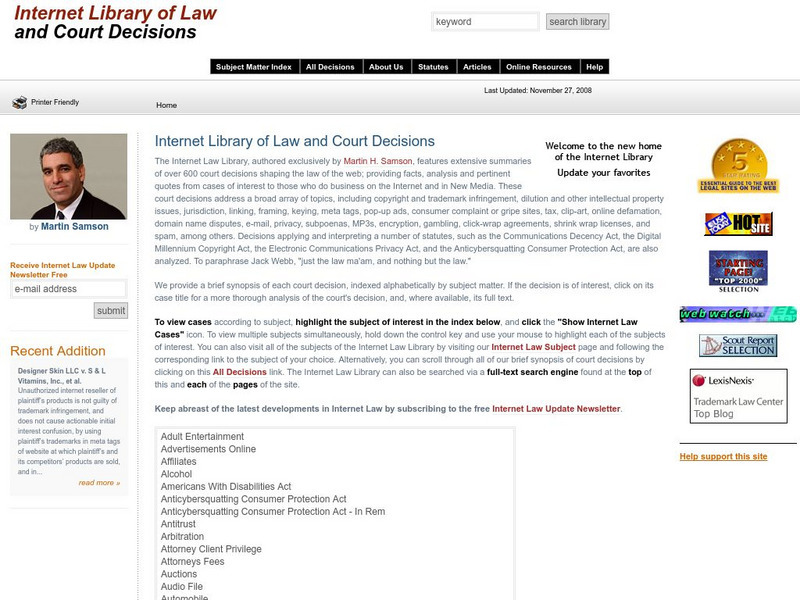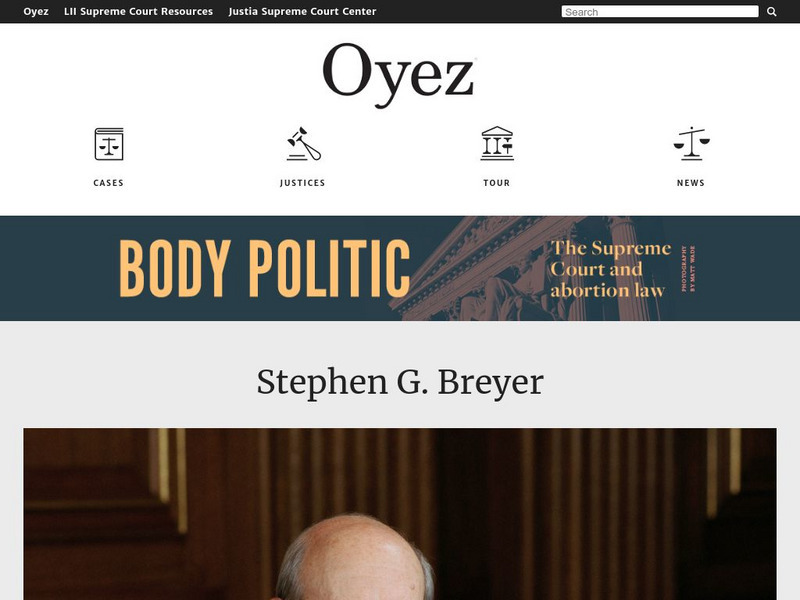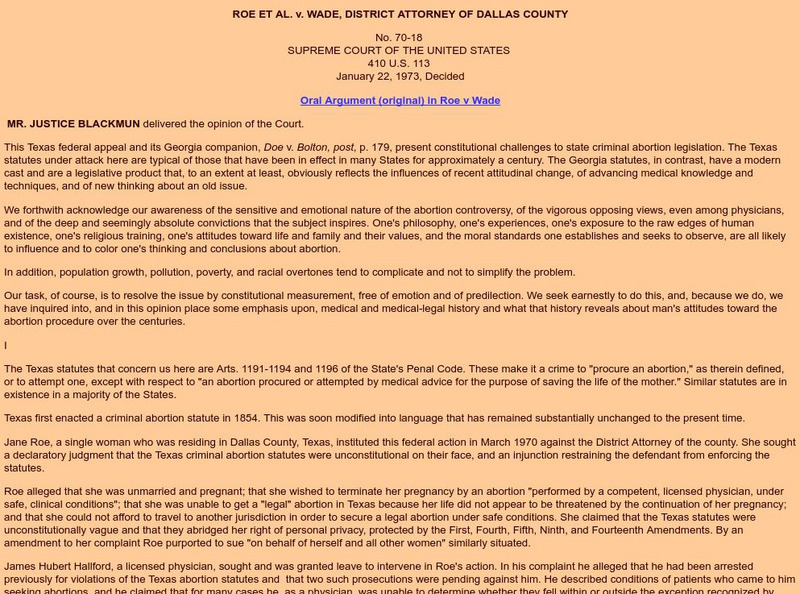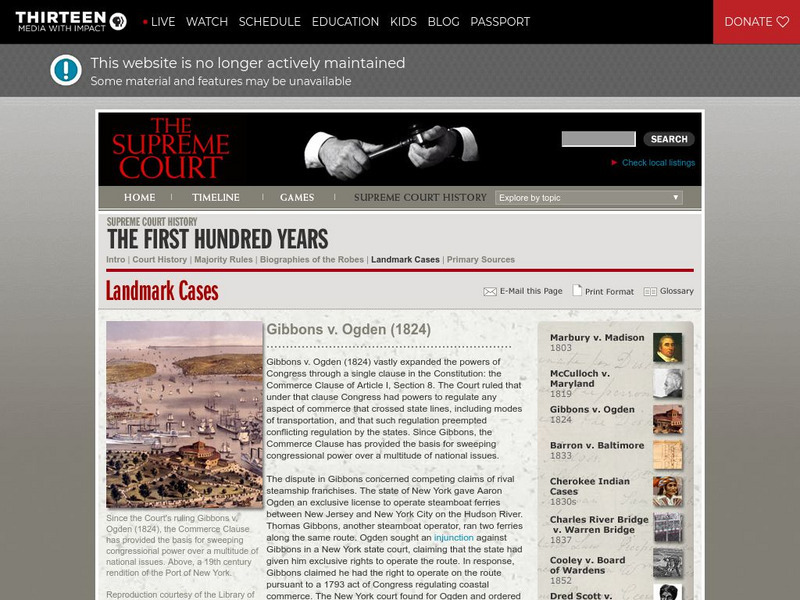Cornell University
Cornell University: Law School: Us Supreme Court: Justice Alito
Biographical information about Supreme Court Justise Samuel Alito. Included in this site from the Cornell Law School is a link to Justice Alito's recent court decisions.
Other
Internet Library of Law and Court Decisions
The Internet Law Library features extensive summaries of court decisions shaping the law of the Web up to 2008. Issues include: intellectual property issues including copyright and trademark; jurisdiction; linking; framing; meta tags;...
Cornell University
Cornell University: Law School: Us Supreme Court: Justice Breyer
Read a brief biography of Supreme Court Justice, Stephen Breyer. Included is a link to the recent decisions in which Justice Breyer was involved, including opinions, concurrences, and dissents. From the Cornell University Law School.
Illinois Institute of Technology
The Oyez Project: Stephen G. Breyer
A lengthy biography of Supreme Court justice, Stephen G. Breyer. Read about the influences in his life, his education, and his experience before joining the Supreme Court. Site also offers a recounting of court opinions in which he has...
iCivics
I Civics: Mini Lesson: Judicial Activism & Restraint
Lesson teaches the judicial philosophies of activism and restraint and also explores criteria through which students can evaluate news-related opinion pieces and practice judging the value of a Supreme Court-related opinion piece of choice.
University of Missouri
Exploring Constitutional Conflicts: Roe v. Wade
This page gives the majority opinion and dissenting opinion of the Roe vs. Wade case of 1973.
PBS
Wnet: Thirteen: The Supreme Court: Landmark Cases: Schenck v. u.s. (1919)
PBS offers a summary of the landmark Supreme Court case of Schenck v. U.S. which dealt with when an individual's free speech rights under the First Amendment presented a "clear and present danger." This case has since been overturned.
PBS
Wnet: Thirteen: The Supreme Court: Landmark Cases: Marbury v. Madison (1803)
PBS features a summary of the landmark Supreme Court case of Marbury v. Madison, which deals with the principle of "judicial review." Opinion written by Chief Justice John Marshall.
PBS
Wnet: Thirteen: The Supreme Court: Landmark Cases: Miranda v. Arizona (1966)
PBS presents a summary of the landmark Supreme Court case of Miranda v. Arizona which ruled that a person suspected of a crime must be informed of their constitutional rights before police questioning, becoming known as the "Miranda...
PBS
Wnet: Thirteen: The Supreme Court: Landmark Cases: Gibbons v. Ogden (1824)
PBS features a summary of the landmark Supreme Court case of Gibbons v. Ogden which dealt with congressional powers through the Commerce Clause of Article I, Section 8. Decision written by Chief Justice John Marshall.
Thomson Reuters
Find Law: u.s. Supreme Court: Gannett Co. V. De Pasquale (1979)
Complete Supreme Court opinion for Gannett Co. V. DePasquale.
iCivics
I Civics: Gideon v. Wainwright (1963)
This mini-lesson covers the basics of the Supreme Court's decision that gave defendants in state criminal courts the right to a lawyer. Students learn about the 6th Amendment right to a lawyer, why the right is important, and how the...
iCivics
I Civics: Hazelwood School District v. Kuhlmeier (1988)
This mini-lesson covers the basics of the Supreme Court's decision that established a school principal's right to censor student articles in the school newspaper. Students learn about the limits on student free speech in a school...
iCivics
I Civics: Korematsu v. United States (1944)
This mini-lesson covers the basics of the Supreme Court's decision that determined the government acted constitutionally when it detained people of Japanese ancestry inside internment camps during World War II. Learners learn what...
iCivics
I Civics: Plessy v. Ferguson (1896)
This mini-lesson covers the basics of the Supreme Court's decision that it was constitutional to keep black and white people segregated as long as the accommodations for each race were "equal." Students learn about the concept of...
iCivics
I Civics: u.s. V. Nixon (1974)
This mini-lesson covers the basics of the Supreme Court's decision that then-sitting President Nixon had to turn over some recordings of his presidential communications to a court of law. Students learn about the Watergate break-in, the...
iCivics
I Civics: Dred Scott v. Sandford (1857)
This mini-instructional activity covers the basics of the Supreme Court decision that determined that Dred Scott, having lived in a free territory, was not entitled to his freedom. Students learn about the impact of the Court's decision,...
iCivics
I Civics: West Virginia State Board of Education v. Barnette (1943)
This mini-lesson covers the basics of the Supreme Court's decision that it was unconstitutional for a state to force students to salute the flag and recite the Pledge of Allegiance. Students learn how the interests of national unity and...
iCivics
I Civics: Bethel School District v. Fraser (1986)
This mini-lesson plan covers the basics of the Supreme Court's decision that established a school's ability to prohibit inappropriate student language on campus. Students learn about the First Amendment right of free speech, and explore...
iCivics
I Civics: In Re Gault (1967)
This mini-lesson covers the basics of the Supreme Court's decision that said juvenile offenders have a right to due process. Students learn about 14th Amendment due process, fairness, and the specific rights afforded juveniles in the...
iCivics
I Civics: Texas v. Johnson (1989)
This mini-lesson covers the basics of the Supreme Court's decision that burning the American flag is a form of political speech protected by the First Amendment. Learners learn about the First Amendment freedom of speech and the...
iCivics
I Civics: Citizens United v. Federal Election Commission (2010)
This mini-lesson covers the Supreme Court's decision about limiting government restrictions on campaign contributions. Young scholars learn about campaign finance, Super PACs, the Bipartisan Campaign Reform Act (McCain-Feingold Act), and...
iCivics
I Civics: Tinker v. Des Moines (1969)
This mini-lesson covers the basics of the Supreme Court's decision that extended First Amendment protections to young scholars in the classroom. Students learn about the concept of symbolic speech and how young scholars gained the right...
iCivics
I Civics: Miranda v. Arizona (1966)
This mini-instructional activity covers the basics of the Supreme Court's decision that prohibited a suspect's statements from being used as evidence unless the suspect has been advised of his or her rights to remain silent. Middle...












